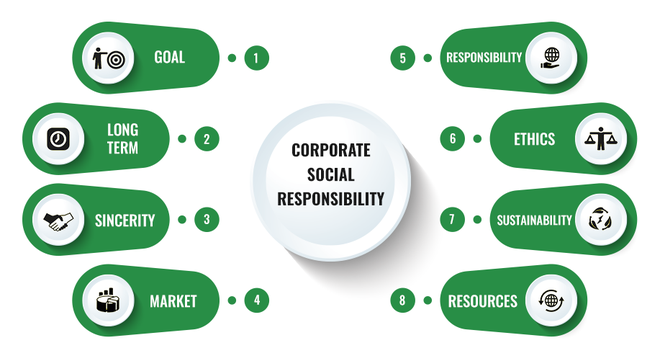Introduction
Corporate social responsibility (CSR) has gained widespread use in recent years. Companies are increasingly expected to go beyond their traditional business objectives and contribute to the social and environmental well-being of the communities in which they operate. But what does CSR stand for, and what does it mean? Here we are talking about What is the full form of CSR?

Here, we are talking about What is the full form of CSR:
What is the full form of CSR?
CSR stands for Corporate Social Responsibility. It refers to a company’s commitment to operating ethically and sustainably while positively contributing to society. This means taking responsibility for how a company’s operations affect the environment and the people in the area. It also means ensuring that business practices are fair and honest.
What are the key components of CSR?
There are several critical components of CSR that companies need to consider to operate in a socially responsible manner:
- Environmental sustainability involves reducing a company’s environmental impact through minimizing waste and emissions and conserving natural resources.
- Social responsibility: This involves contributing to the well-being of the communities in which a company operates, such as supporting local charities and organizations.
- Ethical business practices involve operating fairly and ethically, such as ensuring that all employees are treated respectfully and that the company’s supply chain is free from exploitation.
- Transparency and accountability: This involves being transparent about a company’s operations and impact on society and being accountable for any harmful consequences that may arise.
Why is CSR important?
CSR is becoming increasingly important in the business world for several reasons. Firstly, it can help companies to build a positive reputation and enhance their brand image. Consumers are becoming more socially conscious and more likely to support socially responsible companies. Secondly, CSR can help companies to attract and retain talented employees. Younger generations are more likely to seek out employers who share their values and are committed to making a positive impact on society. Thirdly, CSR can help companies to reduce their environmental impact and improve their operational efficiency. This can lead to cost savings and increased profitability in the long run.
How do companies implement CSR?
There are several ways in which companies can implement CSR:
- Adopting sustainable business practices, such as reducing waste and emissions and conserving natural resources.
- Supporting local communities through charitable donations, volunteering, and other initiatives.
- Ensuring ethical business practices throughout the supply chain, such as ensuring that workers are paid a fair wage and are not subject to exploitation.
- Being transparent about a company’s operations and impact on society and engaging with stakeholders to address their concerns.
FAQs
What does CSR stand for?
CSR stands for Corporate Social Responsibility.
What is Corporate Social Responsibility (CSR)?
Corporate Social Responsibility refers to a company’s commitment to contribute positively to society and the environment through ethical business practices and sustainable initiatives.
What are the key components of CSR?
The key components of CSR include:
- Environmental sustainability
- Social well-being and community development
- Ethical business practices
- Stakeholder engagement and transparency
Why is CSR important?
CSR is important because it helps companies build trust with stakeholders, enhance brand reputation, attract and retain talent, and contribute to sustainable development.
What are some examples of CSR activities?
Examples of CSR activities include:
- Supporting environmental conservation efforts
- Investing in employee well-being programs
- Donating to charitable causes
- Engaging in fair trade practices
- Promoting diversity and inclusion in the workplace
How does CSR benefit businesses?
CSR benefits businesses by fostering long-term sustainability, improving public perception, mitigating risks, and creating shared value for communities and stakeholders.
Is CSR mandatory for businesses?
While CSR is not always legally mandatory, many countries have regulations and guidelines that encourage or require businesses to integrate CSR into their operations.
How can companies measure the impact of CSR initiatives?
Companies can measure the impact of CSR initiatives through various metrics, such as environmental footprint reduction, employee satisfaction surveys, community feedback, and financial performance indicators.
What is the role of leadership in promoting CSR?
Leadership is crucial in promoting CSR. It sets the tone at the top, establishes ethical standards, allocates resources for CSR programs, and engages with stakeholders.
How can individuals support CSR efforts?
Individuals can support CSR efforts by patronizing responsible businesses, participating in volunteer programs, advocating for sustainability, and raising awareness about social and environmental issues.
Conclusion
In conclusion, CSR stands for Corporate Social Responsibility and refers to a company’s commitment to operating ethically and sustainably while also making a positive contribution to society. Companies adopting CSR practices will likely benefit from a positive reputation, increased employee retention, and improved operational efficiency. Companies can play an essential role in creating a more sustainable and equitable society by implementing sustainable business practices, supporting local communities, ensuring ethical business practices, and being transparent and accountable.



